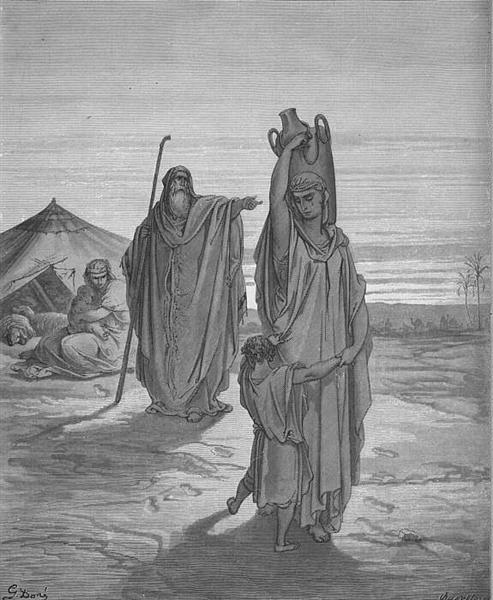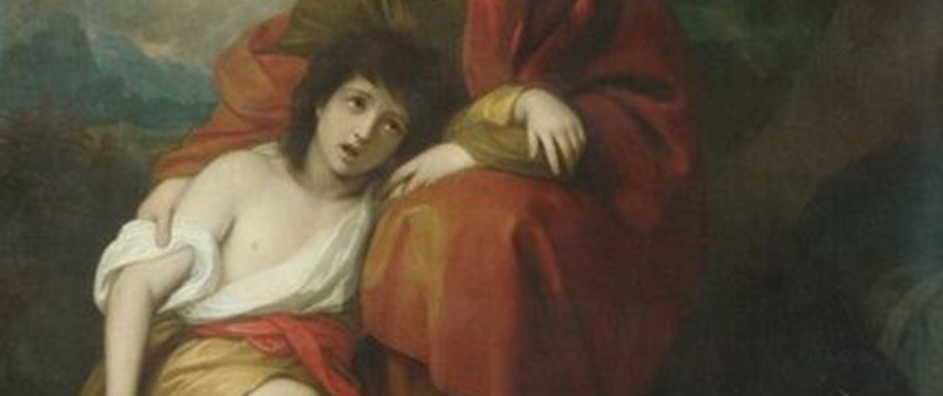The views expressed in our content reflect individual perspectives and do not represent the authoritative views of the Baha'i Faith.
After her vision, Hagar understood that through her son Ishmael, she will have many descendants. The “angel of the Lord said unto her, I will multiply thy seed exceedingly, that it shall not be numbered for multitude.” – Genesis 16:12. This echoes the promise already received by Abraham, that his descendants will be multitudinous.
Hagar also learns from the angel what the life of her son will be like. The description of Ishmael isn’t one that most mothers would find comforting, however. Looking at four different translations gives a better sense of the message Hagar received:
He will be a wild donkey of a man, His hand will be against everyone, And everyone’s hand will be against him; And he will live to the east of all his brothers. – Genesis 16:12 (New American Standard Bible).
And he will be a wild man; his hand will be against every man, and every man’s hand against him; and he shall dwell in the presence of all his brothers. – Genesis 16:12 (American King James Version).
He will be a wild donkey of a man; his hand will be against everyone and everyone’s hand against him, and he will live in hostility toward all his brothers. – Genesis 16:12 (New International Version)
And he will be a wild ass of a man—his hand against all, the hand of all against him, he will encamp in despite of all his kin. – Alter, The Five Books of Moses: A Translation with Commentary, p. 80.
 Taking the information apart phrase by phrase, it is intriguing to learn that the wild ass or wild donkey reference may be an idiom that is not connected with innate character, but indicates that Ishmael and his descendants will, like a wandering wild donkey, lead a nomadic rather than a settled life.
Taking the information apart phrase by phrase, it is intriguing to learn that the wild ass or wild donkey reference may be an idiom that is not connected with innate character, but indicates that Ishmael and his descendants will, like a wandering wild donkey, lead a nomadic rather than a settled life.
In the phrase describing Ishmael’s hand as being “against every man and every man’s hand against him,” the Hebrew word used for hand has an underlying sense of power and movement in a certain direction. Thus the phrase could indicate the problems that Ishmael (and his descendant, Muhammad) will encounter when preaching monotheism to tribes who resist the movement toward one God. He will push the powerful hand of belief toward them, but they will push back against him.
As for living “to the east” or “in the presence of” or “in hostility toward” his brothers, the differing versions demonstrate just how strongly one’s bias can influence a translation and how perilous it can be to rely on a single point of view. The original Hebrew idiom is ‘al pĕnê, an expression that literally means before the face of or in front of and does not necessarily carry an overtone of hostility or conflict. ‘Al pĕnê can also have a geographic connotation, and that is the understanding used by translators who indicate that Ishmael will live “to the east” of Canaan, which is where Arabia is. Others simply indicate that he will be “in the presence of” his brothers. A few, like the relatively recent New International version of the Bible, seem much more eager to interpret the original idiom in light of current world problems, and they have decided that Ishmael’s descendants will live “in hostility” with the religions founded by his brothers. Others take exactly the opposite approach, feeling Ishmael is destined to live and survive in spite of encroachments made by his brethren—i.e., he will “encamp in despite of his kin.”
The Baha’i teachings portray all of this as a direct result of Abraham’s strength in the face of great opposition:
…Abraham stood fast and showed forth extraordinary constancy, and God changed His exile into abiding honour, till at last He established the oneness of God… This exile became the cause of the progress of Abraham’s descendants. This exile resulted in the diffusion of Abraham’s teachings. This exile resulted in the appearance of a Jacob from the seed of Abraham, and of a Joseph who became ruler of Egypt. This exile resulted in the appearance of a Moses from that same seed. This exile resulted in a Hagar being found, of who Ishmael was begotten, and from whom Muhammad in turn descended. This exile resulted in the appearance of the Prophets of Israel from the progeny of Abraham—and so will continue forevermore. …Behold what a power it was that enabled an emigrant to establish such a family, to found such a nation, and to promulgate such teachings. – Abdu’l-Baha, Some Answered Questions, newly revised edition, p. 15.
Hagar, astonished by her encounter with divine truth in the form of an angel, called out to the heavens in wonder, amazed that God has seen her. Shocked to survive such a disquieting event, she asks, “Have I even stayed alive after seeing him?”
In gratitude and in recognition of the truth of the existence of God, Hagar gave the spring of water by which she has rested a name: Beerlahairoi, “The well of the living one, my beholder.” Then she heeds the advice she has received. Hagar returns to her mistress, Sarah, and bears a son, whom she names Ishmael.
















Comments
Sign in or create an account
Continue with Googleor